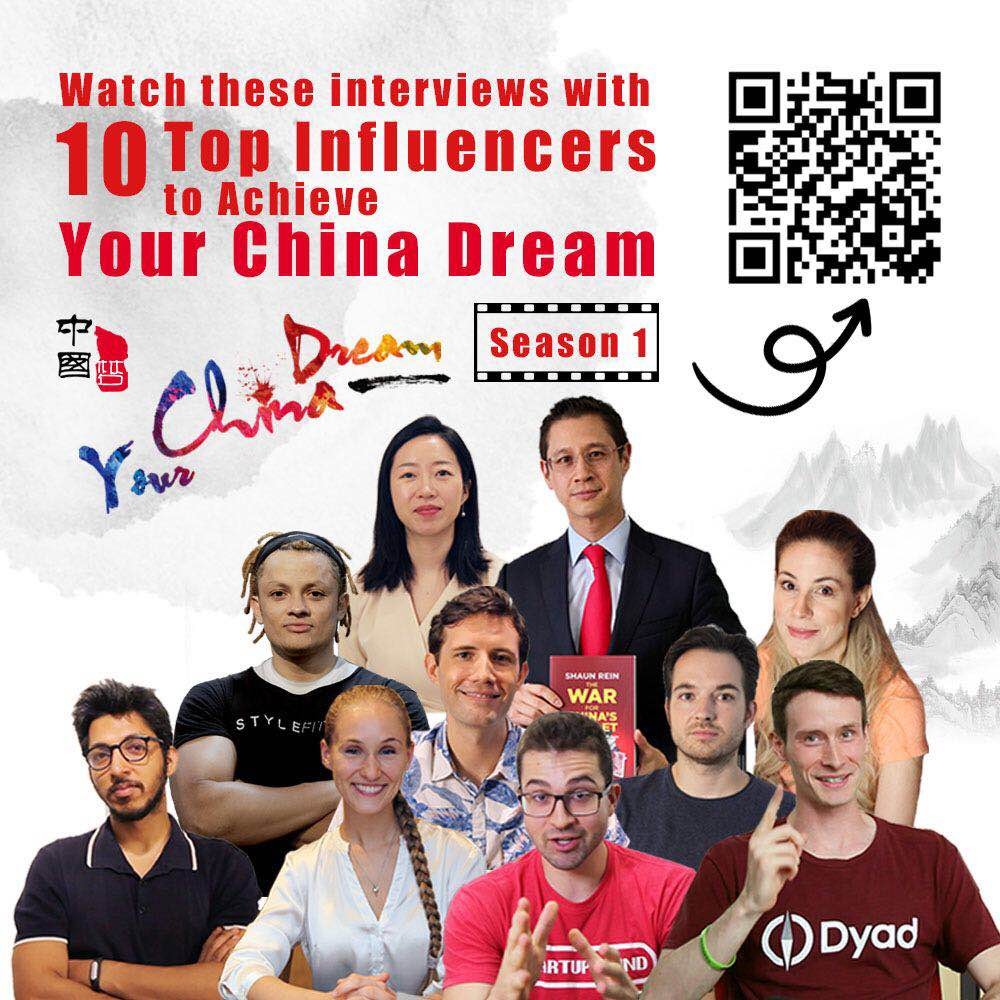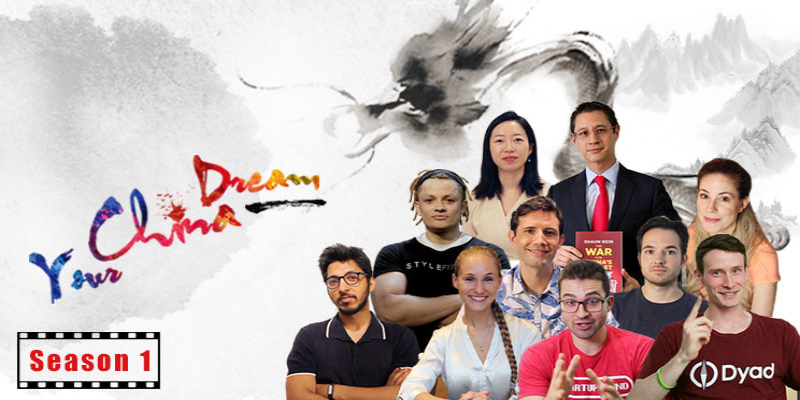“77% Of Americans Don’t Believe The Iconic Rags-To-Riches American Dream” Forbes writes; meanwhile, according to the South China Morning Post, “young people in China are the most optimistic globally about the world’s future, but are also the most fearful about the impact of climate change.”
I left China 3 years ago. I was done. I was out. The pollution was affecting my son’s health and it just wasn’t worth it anymore. I had to leave my businesses, TV appearances, network, and coaching clients behind.
After a few months outside China, feeling a bit homesick, our family started a live-stream vlog to keep up to date with life in China, and catching the wave at just the right moment, suddenly we had 60,000 Chinese eyeballs glued to us daily from the other side of the planet. We could leave the mainland, but China was still watching us.
It wasn’t until I left that I realized just how oblivious people outside China are of what is happening behind the Great Firewall. Worse than that, they often have the wrong idea. We shared our live-stream story with a few Irish entrepreneurs who were trying to expand out to China. They were more interested in getting us to help them set up their website, but sent us a few products anyway to share with our audience. Their sales went through the roof.
They told us, “whatever you are doing, just keep doing that!” I quit my full-time business coaching job, and we became location-free sponsored online influencers traveling around the world with our kids, sharing our life with our audience, coaching individuals and consulting for businesses who were interested in making it in China.
A lot of people I talk to say, “In China, there is no roadmap for success, you just have to figure it out as you go along.” I agree to a certain extent, the good old Chinese saying of crossing the river by feeling the stones.
But that made me ask, “Who else has cracked the China Dream and how did they do it?”
It all started with that question. That question became my most popular article to date. That article gave me a chance to probe the minds of the most interesting foreigners I could find in China. The result was supposed to be the Your China Dream Virtual Summit.
Typical China Dream story, there were hiccups along the way, not least of which was a family emergency that took me back to Europe for a few months putting everything on hold. Then there was the fact that I couldn’t host videos in China without advertising, and by the time I got back, my website was virtually inaccessible in China.
How could I tell the China Dream story without it being available in China? Enter the Chinese tech ecosystem to save the day — bye bye websites, hello WeChat. It’s what WeChat Specialist Joseph Leveque, who refuses to call himself a WeChat Expert, calls “the operating system of China.” His argument against expertise being that the ecosystem is evolving so rapidly, it’s impossible to keep up. It’s taken on a life of its own, like the internet, and has spawned a new generation of entrepreneurs who build their own ecosystems within the WeChat ecosystem.
I can run my business end to end, anywhere in the world. From picking up new clients, to video chat, to booking appointments, to handling payment, to marketing, referrals, and more recently mini-programs, live-streaming, and video content. The list gets longer everyday. People can even watch videos and choose to keep the audio running as they leave WeChat and listen to it like a Podcast.
But mine is not a unique story. There has never been a time or place in the history of humankind where there were so many technological tools at our disposal to make our dreams a reality, than right here and right now in China. I’ve been lucky to interview over 40 of China’s most successful foreign entrepreneurs and influencers on how they got to where they are, sharing what you need to know to achieve Your China Dream. The first 10 interviews are now available as part of Your China Dream Season 1. Meet the line-up, and if you’re interested in hearing their full story, the QR codes below take you to their WeChat-hosted interviews.
Episode 1: Influencing KOL Marketing in China
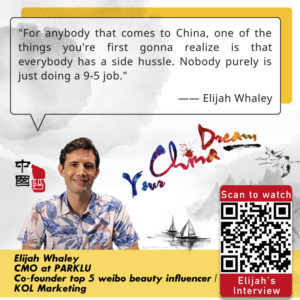 Elijah has created a fascinating career combination as the co-founder of Melilimfu, widely known as one of the Top Beauty Influencer Brands in China and ranking #1 on Weibo in 2018, as well as the CMO of PARKLU, which is ‘the’ influencer marketing platform in China.
Elijah has created a fascinating career combination as the co-founder of Melilimfu, widely known as one of the Top Beauty Influencer Brands in China and ranking #1 on Weibo in 2018, as well as the CMO of PARKLU, which is ‘the’ influencer marketing platform in China.
I dig into Elijah’s story of how he was able to get to where he is today, and was inspired by his talent for leveraging those around him to get the best out of them by truly believing in them.
Elijah is one of those rare people whose genuine kindness shines through, liberally helping others without expectation of anything in return. His advice and encouragement has been instrumental in growing my own brand on multiple platforms.
Episode 2: Chinese Market Made Simple
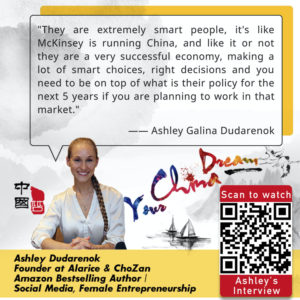 Ashley is a bestselling author, founder of a digital marketing agency and a training company, vlogger, podcaster and keynote speaker.
Ashley is a bestselling author, founder of a digital marketing agency and a training company, vlogger, podcaster and keynote speaker.
She’s spent her career decoding the Chinese Market and her insights are invaluable: “You have to have a lot of respect for the Chinese consumers, they are not just buying what you are pushing, they are teaching you how to serve them better, and for that you need to thank them, and for that you need to innovate and adapt.That is what a lot of Chinese companies are doing so beautifully, and that’s what we need to learn in the West as well.”
Her energy is contagious, and she shares powerful yet simple advice on how to make it in the Chinese Market.
Episode 3: Running for Education Access
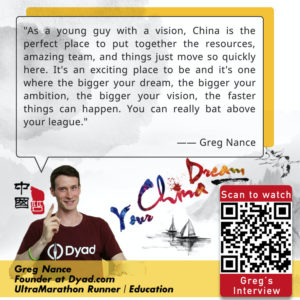 Greg is the CEO and founder of Dyad.com and an UltraMarathon Runner. He has helped students earn over $27 million in scholarships. Greg is a man on a mission, making a serious impact in expanding education access on a global scale, and just ran 7 marathons in 7 days on 7 continents to help students overcome financial barriers to college.
Greg is the CEO and founder of Dyad.com and an UltraMarathon Runner. He has helped students earn over $27 million in scholarships. Greg is a man on a mission, making a serious impact in expanding education access on a global scale, and just ran 7 marathons in 7 days on 7 continents to help students overcome financial barriers to college.
He has a few key memorable phrases like “Best Team Wins” and “Luck Surface Area” that he uses to get everyone aligned on his team from all over the globe, and he’s been able to build a fascinating company culture with a very precise operating language to lead his widely multicultural team.
His passion and perseverance are legendary, and I always get pumped up when I hear him speak.
Episode 4: Argentine-Italian Voice of China
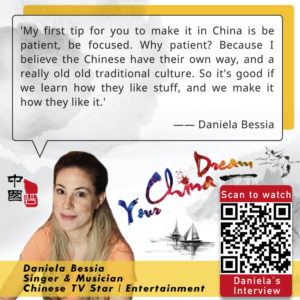 Daniela Bessia is known by millions in China as a TV Superstar, Award Winning Singer and Actress.
Daniela Bessia is known by millions in China as a TV Superstar, Award Winning Singer and Actress.
I first met Daniela as a co-star on Chinese TV and was blown away by her ability to sing in Chinese. She has performed on China’s Got Talent and countless TV shows, and is named a Top 10 expat Influencer in Shanghai, making her one of the most recognizable foreign faces on Chinese TV.
In this interview we meet the down-to-earth girl from Buenos Aires who has a real talent for charming those she meets. I’ve never met anyone so comfortable in front of a camera, and she speaks straight from the heart about making it in China.
Episode 5: Your China Guy for Startups
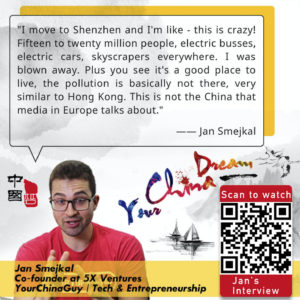 Jan a.k.a. #YourChinaGuy ran the world’s largest startup community, which he managed to grow 500% in less than 2 years.
Jan a.k.a. #YourChinaGuy ran the world’s largest startup community, which he managed to grow 500% in less than 2 years.
His energy and positivity light up the room, and he carries this aura with him wherever he goes that makes it feel like anything is possible when you are talking to him.
He’s one of the best connected people in the Startup community in China and it feels like he is just getting started. He’s always open to sharing his knowledge and experience, and having come in contact with so many start-ups in China, he’s seen what works, or doesn’t.
Episode 6: 30 Day WeChat Entrepreneur
 Kaili is a well known author and blogger, and is of the new generation of entrepreneurs who has a business that runs exclusively on WeChat, focusing on products and online courses to help women find happiness and achieve their dreams.
Kaili is a well known author and blogger, and is of the new generation of entrepreneurs who has a business that runs exclusively on WeChat, focusing on products and online courses to help women find happiness and achieve their dreams.
Her TED talk ‘A Love Story in 30 Days’ was selected as the best TED speech in China in 2015.
While Kaili is not a foreigner, she did study abroad and has a fascinating story having created such an innovative and meaningful project after a close call with death.
Episode 7: Inside a VC Backed Business
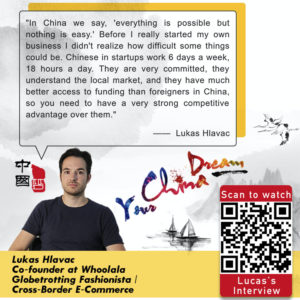 In this episode I talk to Lukas Hlavac, Co-founder of 3 Chinese companies — Whoolala, Lily Madona and Unreal Holiday.
In this episode I talk to Lukas Hlavac, Co-founder of 3 Chinese companies — Whoolala, Lily Madona and Unreal Holiday.
He has a wide range of experience and expertise and takes a humbling realistic approach to business in China. Lukas and his wife have built an impressive following with their travel blogging, tapping into the booming Chinese tourist industry.
He’s one of the few that has managed to raise 1 million dollars from Chinese and foreign investors and is on a quest to prove that foreigners can succeed in China.
Episode 8: When Fitness Meets Style
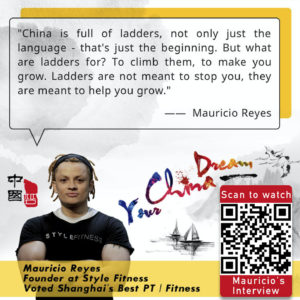 Mauricio a.k.a. Momo is the Founder of Style Fitness. Having been awarded Best Personal Trainer in Shanghai he’s built a brand for himself that nobody in the fitness industry can ignore.
Mauricio a.k.a. Momo is the Founder of Style Fitness. Having been awarded Best Personal Trainer in Shanghai he’s built a brand for himself that nobody in the fitness industry can ignore.
From humble beginnings, Momo has clambered his way up in the Chinese business world. He’s disciplined to the core, and works like a beast, seeing setbacks as “just another ladder to be climbed.”
He’s created a niche of Stylish Fitness that resonates strongly with his Chinese clients, and has managed to do what most Personal Trainers only dream of, with multiple gyms around Shanghai, and it feels like this is just the beginning of an empire about be born.
Episode 9: Growing a Green Community
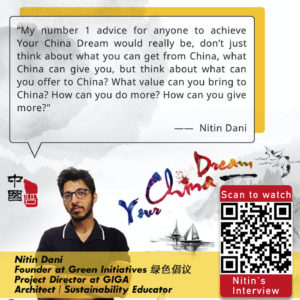 Nitin is the Founder of Green Initiatives, awarded most Innovative NonProfit in Shanghai, and has organized over 350 sustainability events attended by over 25,000 people.
Nitin is the Founder of Green Initiatives, awarded most Innovative NonProfit in Shanghai, and has organized over 350 sustainability events attended by over 25,000 people.
Vulnerably telling us his personal mistakes, Nitin shares some valuable lessons he has learned along the way: “Budget 3 to 6 months of your life for just learning Chinese, that would be the number one thing to do. 6 months, 5 days a week, do it and you will appreciate it for the rest of your life.”
It’s inspiring to hear how he’s managed to maintain his principled values and make such a meaningful impact despite living in a concrete jungle and prejudice he has experienced as an Indian in China.
Episode 10: Win the War for China’s Wallet
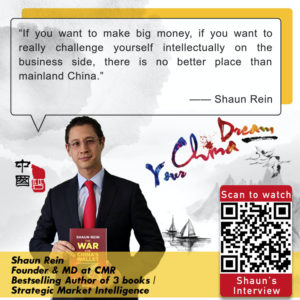 For the Season 1 finale we have Shaun Rein, Founder of the China Market Research Group and author of three bestselling books on China: The End of Cheap China, The End of Copycat China and The War for China’s Wallet.
For the Season 1 finale we have Shaun Rein, Founder of the China Market Research Group and author of three bestselling books on China: The End of Cheap China, The End of Copycat China and The War for China’s Wallet.
While many think of him as a market analyst or business intelligence expert, he makes it clear he is an entrepreneur at heart, with his Market Research company being just one in a long line of projects and investments.
His strong opinions are both controversial and yet he’s been proven right time and again. While he’s interviewed by all the big News channels — BBC, CNN and Bloomberg to name a few, now we have his personal story and lessons from making more money as a university student than a CEO, to completely failing his first startup in China and to what industries he’s bullish on in China right now.
American Dream vs/& China Dream
This is just the start. Three more seasons are on the way, each with another 10 entrepreneurs and influencers to share their stories, including legends like Grant Horsfield, creator of the Naked empire and Jeffrey Towson, bestselling author and LinkedIn Influencer.
But it’s not just about personal success. People I talk to often make the mistake of thinking the China Dream is the same as the American Dream, just in China. The American Dream is an individual’s story from rags to riches, the land of the free where the traveling salesman can become the CEO.
The China Dream doesn’t have much to do with individuals, except for the fact that the collective is made of individuals. The China Dream is not just about you or me, it is about we, and everyone else. The China Dream includes the success of Chinese society as a whole. It’s a collective Dream.
The President of China, Xi Jinping, proudly champions this vision: “The biggest feature of the Chinese dream is that it treats the country, the nation and the individual as a community of common destiny, and closely links the interests of the state, the nation and each individual’s specific interests.” It’s a Dream by design, engineered by the Chinese government. Having already lifted 800 million people out of poverty, the China Dream is well on its way to guiding its people to a new era of prosperity, sustainability and harmony, where you are nurtured as a child, play your part as an adult and live out the rest of your days playing majong, practicing taichi and square dancing in the park.
Up until the last few decades, America may have been your best bet: learn English, move to the States, live the American Dream. Much of the world still thinks that way, and many Chinese do too, until they actually move to America and realize the truth of the world today. Now, you’re much better off learning Chinese, moving to China and realizing the China Dream. As Ray Dalio, arguably the most successful investor of our generation, states: “Results speak for themselves. To have such rates of improvements in so many areas and for so many people has made [China] the greatest economic miracle ever.”
In a beautiful marriage of China-American Dreams, Elon Musk, a South African who lived the American Dream by riding the internet wave and now lives the vision of driving our species to a sustainable future, set a new records earlier this year with the first Tesla Gigafactory outside the US. As the biggest foreign investment in manufacturing Shanghai has ever seen, it’s no surprise that he was awarded Chinese permanent residency without ever having lived in the country, a testament to the Chinese government recognizing the China Dream essence of his motto: “when something is important enough, you do it even if the odds are not in your favor.”
We don’t need more billionaires in the world, we need more dreamers, people who imagine a better future and don’t give up until that future becomes a reality. It just so happens that at this point in history China is the best vehicle to drive to get there.
The problem is, a dragon not an easy vehicle to drive. My intention is to provide a learner’s manual, using stories of those who have done it, for you to figure out how to ride this evolving creature, mapping out your own route and navigating our species to a sustainable future.
We win by coming together. The Wandering Earth, China’s ground-breaking sci-fi and the highest-grossing blockbuster of 2019 so far, symbolizes what must be done; instead of following the American-themed “I can win all by myself” individual heroic journey, the whole world must collectively work together to literally fly our planet to safety.
Our diversity is our strength. Following the theme of international cooperation, there are 9 nationalities represented in Your China Dream Season 1: 3 Americans, 2 Czech, 1 Mexican, 1 Indian, 1 Russian, 1 Argentine-Italian, 1 Chinese and myself, an Irishman who grew up in Africa and has worked on 5 continents. It is my hope that through embracing diversity, we can find a way as a species to conquer not each other, but the uniquely complex challenges of this century.
I have been on a mission to find the ‘Dragon Riders” in China whose stories and insights provide us the hacks that make all the difference, the more of which you use the easier your journey becomes, the faster you get to your destination and ideally the more likely ‘we’ are to survive the trip without getting burned alive.
The master hack that all of the influencers have is not a detailed business plan, nor is it access to capital, but rather an inspiring answer to the question: “Do you have a China Dream important enough to invest everything you’ve got?”
